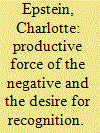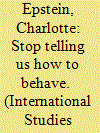|
|
|
Sort Order |
|
|
|
Items / Page
|
|
|
|
|
|
|
| Srl | Item |
| 1 |
ID:
162488


|
|
|
|
|
| Summary/Abstract |
In this article, the introduction to this Special Issue, we underline the importance of the dynamics of misrecognition for the study of world politics. We make the case for shifting the focus from ‘recognition’, where it has long been cast in social, political and, more recently, International Relations theory, to misrecognition. We do so by returning to the original theorisation of misrecognition, Hegel’s dialectic of the master and servant. Our point of departure is not only that the desire for recognition is key social dynamic, but that the failure to obtain this recognition is built into this very desire. It is a crucial factor for understanding how international actors behave, including, but not only, states.
Thus understood, the desire for recognition is not simply a desire for social goods, for status or for statehood, but for more agency – more capacity to act. We explore the logic of misrecognition and show how the international system is a symbolic structure that is ordained by an unrealisable ideal of what we call ‘sovereign agency’.
|
|
|
|
|
|
|
|
|
|
|
|
|
|
|
|
| 2 |
ID:
162489


|
|
|
|
|
| Summary/Abstract |
In this article I theorise the concept of misrecognition that we aim to bring to the study of international politics with this Special Issue. I draw upon three sources to do so: recognition theory, Hegel, and Jacques Lacan. I show that, while the seeds of an interest in misrecognition were laid in that interdisciplinary Hegelian scholarship known as recognition theory, it remains underdeveloped. To develop it into a concept I chart a path through recognition theory back to Hegel’s original dialectic of the master and servant in the Phenomenology of Spirit. What the dialectic captures, I argue, are the actual dynamics of misrecognition in social life, not an idealised form of recognition. This foundational, constitutive misrecognition is what Lacan also theorises by way of his concept of ‘fantasy’. Both Hegel and Lacan foreground a misrecognised, desiring subject that challenges the ways in which agency has been understood in international politics. Lastly, I show the purchase of a Hegelian-Lacanian analysis for IR by considering the relations between sovereignty and nuclear weapons under the lens of fantasy.
|
|
|
|
|
|
|
|
|
|
|
|
|
|
|
|
| 3 |
ID:
118949


|
|
|
|
|
| Publication |
2013.
|
| Summary/Abstract |
In this article, we consider how states wield shaming strategies to 'be green' and to try to influence other states to 'become green' - environmentally responsible states. We compare Australia-Japan relations in the international politics of whales and tuna, respectively, and show that only at the level of norms and identities, rather than material interests, can two seemingly contradictory behaviors be reconciled, where a country shames another in one case (whales) and deliberately spares it from shaming in another (tuna). We argue that each issue reveals two different ways in which Australia seeks to construct itself as an environmentally responsible state, following a 'preservationist' and a 'conservationist' paradigm, respectively. We thus contribute to the constructivist understanding of the role of norms of global environmental politics and of the links between norms, identities, and the choice of shaming as an instrument of foreign policy.
|
|
|
|
|
|
|
|
|
|
|
|
|
|
|
|
| 4 |
ID:
114086


|
|
|
|
|
| Publication |
2012.
|
| Summary/Abstract |
In this paper, I use a phenomenon of resistance to a global norm as a catalyst to critically re-examine the cognitive frames underpinning the use of the concept of socialization in international relations. My critique, which adds to the now growing critique of constructivism's neglect of the role of power in the international system, is threefold. First, socialization tends to be apprehended as a bettering of the socializee, because of an implicit teleological assumption of change as progress. Second, the concept tends to frame out the perspective of the socializee. Third and relatedly, it infantilizes the socializee. I use the international politics of whaling to illustrate the practical and conceptual effects of this infantilization of the socializee and specifically the ways it curtails both policymaking and scholarly research. The purpose of my efforts here are not to discount the usefulness of "socialization" in understanding norm dynamics but to caution against these three particular forms of silencing effected by the epistemological apparatus that has taken shape around it.
|
|
|
|
|
|
|
|
|
|
|
|
|
|
|
|
| 5 |
ID:
120164


|
|
|
|
|
| Publication |
2013.
|
| Summary/Abstract |
The rationalist-constructivist divide that runs through the discipline of International Relations (IR) revolves around two figures of agency, the rational actor and the constructivist "self." In this article I examine the models of agency that implicitly or explicitly underpin the study of international politics. I show how both notions of the rational actor and the constructivist self have remained wedded to individualist understandings of agency that were first incarnated in the discipline's self-understandings by Hobbes's natural individual. Despite its turn to social theory, this persistent individualism has hampered constructivism's ability to appraise the ways in which the actors and structures of international politics mutually constitute one another "all the way down." My purpose is to lay the foundations for a nonindividualist, adequately relational, social theory of international politics. To this end I propose a third model of agency, Lacan's split speaking subject. Through a Lacanian reading of the Leviathan, I show how the speaking subject has in fact laid buried away in the discipline's Hobbesian legacy all along.
|
|
|
|
|
|
|
|
|
|
|
|
|
|
|
|
| 6 |
ID:
105952


|
|
|
|
|
| Publication |
2011.
|
| Summary/Abstract |
This article aims to show the theoretical added value of focussing on discourse to study identity in international relations (IR). I argue that the discourse approach offers a more theoretically parsimonious and empirically grounded way of studying identity than approaches developed in the wake of both constructivism and the broader 'psychological turn'. My starting point is a critique of the discipline's understanding of the 'self' uncritically borrowed from psychology. Jacques Lacan's 'speaking subject' offers instead a non-essentialist basis for theorizing about identity that has been largely overlooked. To tailor these insights to concerns specific to the discipline I then flesh out the distinction between subject-positions and subjectivities. This crucial distinction is what enables the discourse approach to travel the different levels of analyses, from the individual to the state, in a way that steers clear of the field's fallacy of composition, which has been perpetuated by the assumption that what applies to individuals applies to states as well. Discourse thus offers a way of studying state identities without presuming that the state has a self. I illustrate this empirically with regards to the international politics of whaling.
|
|
|
|
|
|
|
|
|
|
|
|
|
|
|
|
|
|
|
|
|